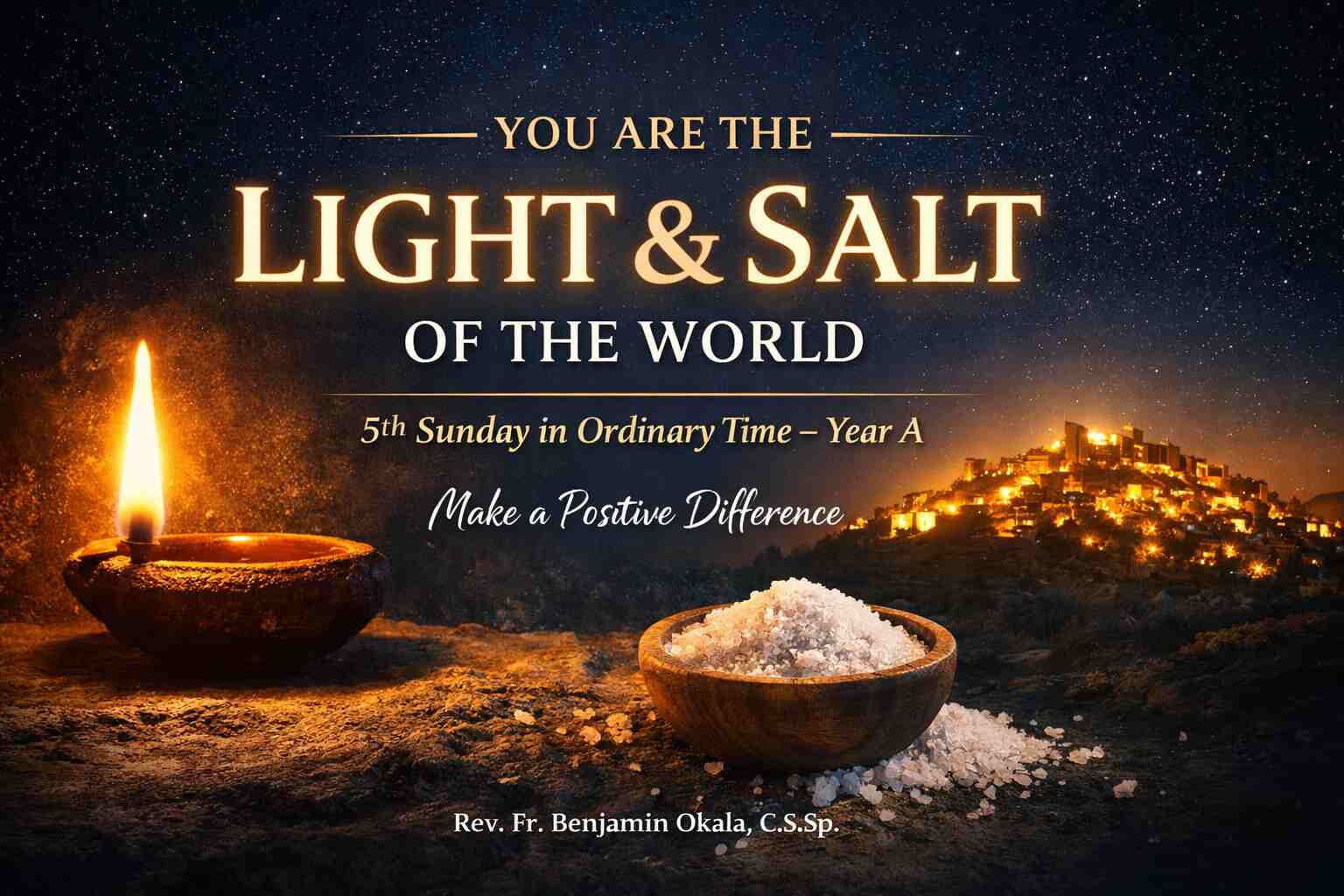HOMILY FOR THE 16TH SUNDAY IN ORDINARY TIME, YEAR A
First Reading: Wisdom 12:13, 16-19; Second Reading: Romans 8:26-27; Gospel: Matthew 13:24-43
Our world is like a tapestry woven with threads of good and evil people. Most times, the longing for justice moves us to uproot evil people forcefully. Moreover, good people always wish that God would destroy and remove evildoers from their midst. Sometimes, their wishes do not come to fruition immediately as envisaged, and they wonder why God allows evil to thrive and good people to suffer.
In this Homily for the 16th Sunday in Ordinary Time, Year A, we shall reflect upon the paradox of God’s mercy and justice amidst the coexistence of good and evil in the world, His gift of repentance, and the intercession of the Holy Spirit, and discover how we can nurture our souls amidst the complexities of life.
The Parable of Wheat and Weeds: Embracing the Coexistence of Good and Evil

In the Gospel reading, Jesus Christ narrates the parable of wheat and weeds. He says, “The kingdom of heaven may be compared to a man who sowed good seed in his field; but while men were sleeping, his enemy came and sowed weeds among the wheat and went away” (Matthew 13:24–25). This reminds us of the coexistence of good and evil in the world.
Surprisingly, when the servants wanted the weeds to be removed, the owner of the field responded, “No, because when trying to remove the weeds, you may uproot the wheat along with them. Let both of them grow together until the harvest; and at harvest time I will tell the reapers, Collect the weeds first and bind them in bundles to be burned, but gather the wheat into my barn” (Matthew 13:29–30).
Just as weeds grow alongside the wheat, so too does evil persist alongside the goodness that God has sown. However, Jesus Christ advises us against making hasty judgments and advocates allowing both the wheat and weeds to grow until the harvest. Hence, this mirrors life’s complexity, urging us to embrace tolerance and understanding instead of rushing to conclusions about others.
Navigating Opposition with Faith and Integrity

Unfortunately, most times, good people always try to forcefully uproot bad people in our society by engaging them in physical combat instead of reporting them to God Almighty in prayers for His divine intervention (1 Peter5:7). Even when good people try to show love to them, bad people continue to fight them. Jesus Christ says, “Do not be afraid of them” (Matthew 10:28).
Astonishingly, sometimes, when bad people hear good news about you, they stay silent. When they hear bad news about you, they spread it like wildfire, but when they hear nothing about you, they conjecture and make things up. However, it is important to remember that you cannot control what people say about you or how they perceive you. Instead, focus on doing good and being the best version of yourself, and let your actions speak for themselves. Over time, your character and integrity will be rewarded by God Almighty.
Since the Almighty God is merciful, loving, and just, He is always patient with evil people and offers them the opportunity to repent. Hence, we are called to resist the temptation to judge and uproot the weeds prematurely, for it is God’s role to separate the wheat from the weeds at the time of harvest. Instead, let us focus on nurturing the goodness within ourselves and others, trusting in God’s ultimate justice.
God’s Merciful Gift of Repentance: A Path to Transformation

In the first reading, we encounter a God who is both just and merciful. God’s justice demands repentance for sins, but His mercy provides the opportunity for transformation. He offers us the gift of repentance, inviting us to turn away from our wrongdoing and embrace His forgiveness. For it is through repentance that we open ourselves to the transformative power of God’s love and mercy.
It is worthy of note that God does not want the death of a wicked man but wishes that he repents and comes back to Him. Yes, He is always patient with us as we repent and return to Him before we die (Ezekiel 18:23, 32). Certainly, God is not looking at the magnitude of our sins but at how humble we are to say we are sorry whenever we make mistakes (Psalm 51:17). So, let us humbly approach God’s throne of mercy, seeking His forgiveness and allowing His grace to renew and transform our lives (2 Chronicles 7:14; Hebrews 4:16).
The Holy Spirit’s Intercession in Our Weakness

Sometimes, we may find it very difficult to return to God, perhaps because of what people may say. We may even feel too weak to pray or not know how to pray. Nevertheless, St. Paul reminds us in the second reading, of the profound role of the Holy Spirit in our lives. He says, “Likewise, the Spirit helps us in our weakness; for we do not know how to pray as we ought, but the Holy Spirit intercedes for us with sighs too deep for words, understanding our deepest longings and weaknesses” (Romans 8:26).
Therefore, in times of struggle and uncertainty, when we do not know how to pray or express our needs, we need to rely on the intercession of the Holy Spirit. When we do that, we should rest assured that the Holy Spirit will surely help us once we are ready for repentance and respond according to His perfect will.
Embracing God’s Paradox of Mercy and Justice: Navigating Life’s Complexities

The paradox of God’s mercy and justice calls us to embrace both aspects of His nature. We are called to acknowledge our need for repentance and seek God’s mercy while recognizing the coexistence of good and evil in the world and trusting in His ultimate justice. As we navigate the complexities of life, let us hold fast to the assurance that God’s mercy is always available to us, always knocking at the door of our hearts to dine with us, and when we give Him the opportunity, His justice will ultimately prevail (Revelation 3:20).
Conclusion
This Homily for the 16th Sunday in Ordinary Time, Year A, invites us to reflect on the paradox of God’s mercy and justice. The Gospel reading explores the coexistence of good and evil in the world and urges us to be patient with evil people, not to uproot them forcefully by all means, but to allow God’s justice to prevail. We can achieve this by being firm and persistent in doing good and keeping our eyes fixed on Jesus Christ, the author of our faith (Hebrews 12:2). Besides, cultivating virtues such as love, compassion, and forgiveness can strengthen our connection with God and fellow human beings.
Furthermore, we are also reminded of God’s merciful gift of repentance and not to take it for granted by being persistent in doing evil. Rather, we are called to always make efforts to repent from doing evil and confidently turn to God in prayer so as to obtain His mercy (Hebrews 4:16). Certainly, once we make up our minds to return to God like the prodigal son (Luke 15:1–11), then the Holy Spirit will surely intercede for us in our weakness and will always pray on our behalf.
Prayer:
May the Almighty God protect you from any evil manipulation and grant you the grace to always nurture your soul amidst the complexities of life. May the Holy Spirit help you to cultivate virtues such as love, compassion, and forgiveness; be repentant when you fall into sin while trusting in God’s ultimate justice, through Jesus Christ, Our Lord, Amen.
Peace of Christ be with you…
Rev. Fr. Ben Okala, C.S.Sp.



